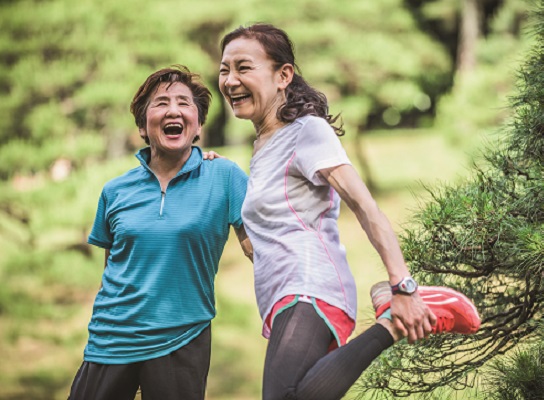Empowering a Healthier Silver Generation

As Singapore’s population ages, it is all the more vital that we adopt preventive healthcare measures for our elderly. Geriatric specialist Dr Chan Kin Ming tells us more.
No doubt about it, our pioneers have slogged hard to build Singapore into what she is today. Prime Minister Lee Hsien Loong’s announcement of a $8 billion Pioneer Generation Fund, which offers those born before 1949 subsidies for outpatient care, Medisave top-ups and life-long subsidies for MediShield Life, is definitely a step in the right direction to help them cope with healthcare costs. However, prevention is always better than cure. Our pioneers’ quality of life can be much better if preventive healthcare measures are adopted to help them manage the challenges they face as they age.
There are three life stage challenges as a person grows old, highlighted geriatric specialist Dr Chan Kin Ming of Chan KM Geriatric & Medical Clinic Pte Ltd. The first are the ‘young old’ who are in their 60s, with some still working while others are retiring or just retired. “Retirement is a stressful event as it brings about changes that the older person may not be prepared for or unaware of. There is loss of social role and esteem as they now become a ‘dependent’. Having nowhere to go and nothing to do require psychological and emotional adjustment, unless they are prepared for it. As they ‘take it easy’ daily, this could lead to a decline in physical and mental functioning,” warned Dr Chan, adding that it may also result in changes and friction within the family relationship. They are also at the age when they start to have concerns about their health.
The second group are those in their 70s when frailty commonly sets in. A decline in their general health status further leads to decreased ability in their activities in daily living and mobility and causes further social isolation. They also start experiencing ‘loss’ – loss of spouse and friends of similar age, and loss of their own abilities, leading to low self-esteem and loneliness. “They start contemplating issues of being a burden to their family and issues of death.”
The third group are those aged 80 and older who need more assistance including personal effects like bathing and toileting and face increased risk of falls. Their ‘social’ and ‘physical space’ shrinks further as many become home bound, sometimes room bound, chair bound or bed bound. “Their social isolation becomes even more acute as even more of their peers and friends passed on. The issue of death becomes closer and they need to reconcile with that,” said Dr Chan.
How can preventive healthcare help our pioneers in their twilight years? Dr Chan shared his pearls of wisdom.
What is preventive healthcare?
There are 3 aspects of preventive healthcare. Primary prevention is the prevention of disease or injury before it occurs. For example, smoking is a cause of many chronic lung conditions like bronchitis, emphysema and even lung cancer. By preventing people from taking up smoking and by getting existing smokers to stop smoking, we could prevent the onset of these chronic lung conditions. In the elderly, it could also mean vaccinations against influenza or the prevention of falls by providing an appropriate physical environment like adequate lighting, having less steps or highlighting them, non-slip floors and having proper furniture, so that they could walk about safely and not fall.
Secondary prevention aims to stop or reverse a problem before it becomes symptomatic, through early detection. For example, identifying visual deterioration through eye screening to pick up early glaucoma or macular degeneration. These conditions may have no symptoms at the early stages but if allowed to progress, can cause blindness later. Other examples include the use of Bone Mineral Density to screen for early osteoporosis and to treat the condition when it is detected.
Tertiary prevention focuses on reducing disability and restoring functionality to people already affected by disease or injury. For example, a person with arthritis of the knees may need treatment of the pain with drugs or even surgery, followed by a course of physical rehabilitation to restore function.
What are some common health problems that our elderly face which will benefit from preventive healthcare?
Some common health problems include hypertension, diabetes, cancers (especially colon cancer), osteoporosis, atrial fibrillation, bladder and bowel problems like urine incontinence and constipation, falls, dementia, frailty and visual and hearing impairment. In elderly care, we often mention the ‘Giants of Geriatrics’ being:
- Iatrogenic causes as a result of inappropriate use of drugs, polypharmacy and drug interactions
- Incontinence of urine and stools
- Immobility, often caused by multiple causes like arthritis, heart and lung disease, stroke, visual impairment, fractures
- Instability and falls due to stroke, Parkinson’s disease, arthritis, unstable gait and balance
- Impaired cognition – depression, dementia and delirium.
Elderly people usually grow old with medical conditions that they had when they were younger. These often become chronic and complications arise from them. In addition, they develop new problems common in the elderly. For example, if a person has diabetes at 50 years old, by the time he becomes 70, he’ll have a 20-year history and would have developed some or all of the complications associated with diabetes, such as eye problems causing visual impairment, skin problems like ulcers, peripheral vascular disease, kidney disease and neuropathy (damage to the nerves). The vascular damage from diabetes will increase his risk of heart disease, stroke and even limb amputations. Neuropathy increases his risk of falls, injuries and fractures, especially so because diabetics are at risk of developing osteoporosis, the risk of diarrhoea, constipation, weakness of bladder muscle and urinary incontinence. Hence, from one initial condition, it can lead to so many possible complications causing instability, immobility, impaired cognition and incontinence. Therefore, each contributing factor of his morbidity needs to be managed carefully.
In a general population of community dwelling who are older than 60 years old in Singapore, 51% have poor vision, 46% rheumatism, 36% heart disease, 22% diabetes mellitus, 20% urine incontinence, 16% falls and 9.3% poor memory 9.3%.
What type of preventive healthcare do you recommend?
The elderly tend to have many health problems. It is difficult for them or their families/caregivers to know which problem or complaint is a result of age (and therefore they have to live with it) and which is disease (and therefore can be treated). Hence, regular health screening and check-ups are important, bearing in mind that many elderly are stoic and tend to play down their complaints, show an ageism attitude (“I fall down because I am old, or I am breathless because I am old”) or just do not like to see doctors or get admitted to hospitals.
The health screening for the older person is different from those for younger adults because there is an emphasis on their function “ physical and mental functions, medication that they are taking, including all the health supplements bought over-the-counter as they also contribute to polypharmacy and interactions with the medicine that the person is taking.
How have your patients benefitted from preventive healthcare?
Many patients have benefitted from successful preventive healthcare, including an 80-year-old man. He refused to see any doctor because he declared himself “very well and very strong”. However, his family noted that he was limping and fell frequently, something he attributed to old age. To ‘trick’ him into coming to my consultation room, his family told him that a daughter was unwell and needed to see me. I had to ‘role play’ with the family, initially asking the daughter some general questions and later directing the questions to him when he got familiar with me. I even did a general physical examination and advised him to go for a general blood screen since he was already here. It showed he has early onset of Parkinson’s disease which caused him to be unsteady and fell frequently, and recurrent gouty arthritis, causing him to limp with pain. When he was treated, his strength, balance and gait improves. The gouty arthritis subsided and he no longer limps and do not have any more pain in his knees. In the words of his children: “He walks faster than us now” and has started travelling again.
Should our elderly be put on a national health programme, just like what we have for babies?
It would be ideal if there is such a comprehensive programme for the elderly above the age of 60 years old. This programme should have a general medical screening for hypertension, diabetes, lipids, vision, hearing tests, oral health, gait, balance, muscle strength and falls risk, continence, mood and cognitive functional screen, nutritional screen, bone mineral density and screening for colon and breast cancer.
What to screen for and what vaccines to recommend depend on the patient’s history and findings of the clinical examination. But in general, annual influenza vaccination, pneumococcal vaccination and zoster vaccination are recommended for adults 60 years and older by the US Centre for Disease Control and Prevention.
The government recently announced a slew of measures under the Pioneer Generation Package during the Budget 2014, which aims to help our elderly with health-care costs. What do you think of these measures?
The announcement of this package is certainly a big relief and welcome for our pioneer generation and is targeted to benefit everyone in that generation, especially the poor. However, it is not useful if no one knows about it or knows how to access it. Similarly, existing facilities and manpower should be able to cope with the possible influx of patients utilising the facilities. I’m sure these are some teething problems that may arise but they should sort themselves out pretty soon.
Preventive healthcare is always difficult because the person is subjected to a change of lifestyle and the need to take drugs on a long term basis. They may be very enthusiastic initially, but after a while, they may lose the stamina to continue, especially when they may not even have the disease in the first place. This difficulty is multiplied many fold in the elderly, especially when they start thinking, “How many more years do I have left?” and “I’m already so old.” Therefore, it is a difficult balance to ‘enforce’ the strict lifestyle that is sometimes needed in preventive healthcare, versus the patient’s pragmatic view of his own life and lifestyle.
Thus, preventive steps have to be individualised to the person. But on a national level, to help the elderly achieve and maintain good health, there should be on-going education on conditions that are common for the elderly, perhaps with free admissions to such talks and done in a language or dialect that they can understand. There should be opportunities for health screening and healthy lifestyle “spaces for exercise, formation of exercise or activities groups, each elderly having a health tracking booklet, just like the health booklet that accompanies each baby born in Singapore. This will keep track of their vaccinations, annual health checks, illnesses etc.”
Article contributed by Dr Chan Kin Ming, an accredited doctor of Mount Alvernia Hospital.
Note : Please note that health information is provided to supplement the care provided by your doctor. It is not intended nor implied to be a substitute for professional medical advice. Always seek the advice of your physician if you have any questions regarding a medical condition.



